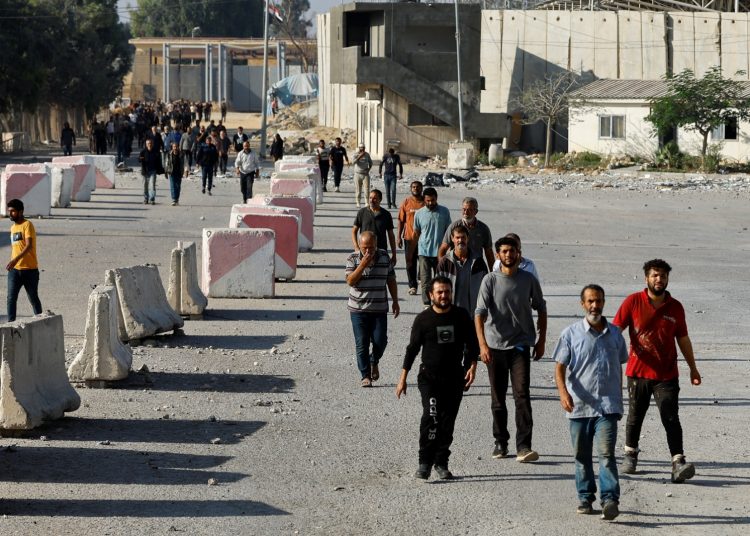TEL AVIV – US Secretary of State Antony Blinken arrived in Tel Aviv on Friday to push for humanitarian pauses in the Gaza war after Israel said its troops had surrounded the Palestinian enclave’s biggest city, the focus of its drive to wipe out Hamas.
Israeli forces again pounded the Gaza Strip from ground, sea and air throughout the night amid global alarm over horrendous conditions inside the besieged territory and rising number of deaths of Palestinian civilians.
Allied militant groups Hamas and Islamic Jihad said their fighters had detonated explosive devices against advancing troops, dropped grenades from drones, and fired mortars and anti-tank rockets in fierce urban warfare around destroyed buildings.
Blinken, on his second trip to Israel in a month, is due to discuss with Prime Minister Benjamin Netanyahu concrete steps to minimise harm to civilians in Gaza, where food, fuel, water and medicine are running out, buildings have been flattened, and thousands of people have fled homes to escape relentless bombings.
The White House said any pauses in fighting should be temporary and localised. It has dismissed calls from Arab and several other nations for a full ceasefire in the war, now in its 28th day.
“When I see a Palestinian child – a boy, a girl – pulled from the rubble of a collapsed building, that hits me in the gut as much as seeing a child from Israel or anywhere else,” Blinken told reporters before leaving for Israel.
“So this is something that we have an obligation to respond to, and we will.”
Gaza health authorities say at least 9,061 people – many of them women and children – have been killed since Israel started its assault on the enclave of 2.3 million people in retaliation for deadly attacks by Hamas militants on southern Israel.
Israel says Hamas killed 1,400 people, mostly civilians, and took more than 240 hostages in the attacks on Oct. 7, the deadliest day of its 75-year history.
On Thursday, Netanyahu said the military had encircled Gaza City and was advancing. The Israeli military said on Friday its war planes, artillery and navy had struck Hamas targets overnight, killing several militants including Mustafa Dalul, a Hamas commander it said had directed combat in Gaza.
There was no immediate confirmation from Hamas.
In one Israeli air strike in Khan Younis in southern Gaza, a local journalist working for the official Palestine TV and at least nine of his immediate family were killed in their house, relatives and health officials said.
The United Arab Emirates, one of a handful of Arab states with diplomatic ties to Israel, said on Friday it was working “relentlessly” for an immediate ceasefire, warning that the risk of regional spillover and further escalation was real.
Israel has dismissed these calls, saying it targets Hamas fighters whom it accuses of intentionally hiding among the population and civilian buildings.
Blinken is due to meet Jordan’s Foreign Minister Ayman Safadi in Amman on Saturday. In a statement, Safadi said Israel must end the war on Gaza, where he said it was committing war crimes by bombing civilians and imposing a siege.
The Israeli military said its troops and tanks were encountering mines and booby traps as they advanced in Gaza. Hamas fighters were making use of a vast underground tunnel network to stage hit-and-run attacks.
Israel has said it has lost 23 soldiers in the offensive.
Abu Ubaida, spokesperson for the armed wing of Hamas, said in a televised speech that Israel’s death toll in Gaza was much higher. “Your soldiers will return in black bags,” he said.
Two US officials, speaking on the condition of anonymity, said the United States was flying intelligence-gathering drones over Gaza to help locate hostages.
The Rafah crossing from Gaza to Egypt was due to open for a third day on Friday for limited evacuations under a Qatari-brokered deal aimed at letting some foreign passport holders, their dependents and some wounded Gazans out of the enclave.
According to border officials, more than 700 foreign citizens left for Egypt via Rafah on the two previous days. Dozens of critically injured Palestinians were to cross too. Israel asked foreign countries to send hospital ships for them.
Israel also sent back around 7,000 Palestinian workers in Israel and the West Bank before Oct. 7 to Gaza through the Kerem Shalom crossing in the south. Workers said they had been detained and ill-treated by Israeli authorities.
Those who live in Gaza City and the north will have to find shelter elsewhere as the Israeli forces have cut off roads.
While Israel intensifies its assault against Hamas, diplomats in the United Nations, Washington and the Middle East have started floating ideas for a post-Hamas Gaza – provided Israel succeeds in removing the Iran-backed militant group, which has ruled the enclave since 2007.
Israel has so far failed to come up with an endgame to the conflict, and a source familiar with the matter said discussions so far include the deployment of a multinational force, an interim Palestinian-led administration that would exclude Hamas, a stopgap security and governance role for neighbouring Arab states, and temporary U.N. supervision of the territory.
A group of independent United Nations human rights experts warned that Palestinians in Gaza are at “grave risk of genocide”. The Israeli mission to the U.N. in Geneva called the rapporteur’s comments “deplorable and deeply concerning” and blamed Hamas for the civilian deaths.
Palestinians trapped in Gaza City hoped that a truce could be reached soon.
“Does the world wait for hundreds of thousands who refuse to leave their home, who have no guilt but that they don’t want to leave their country, to be massacred by Israel?” said one.






Discussion about this post